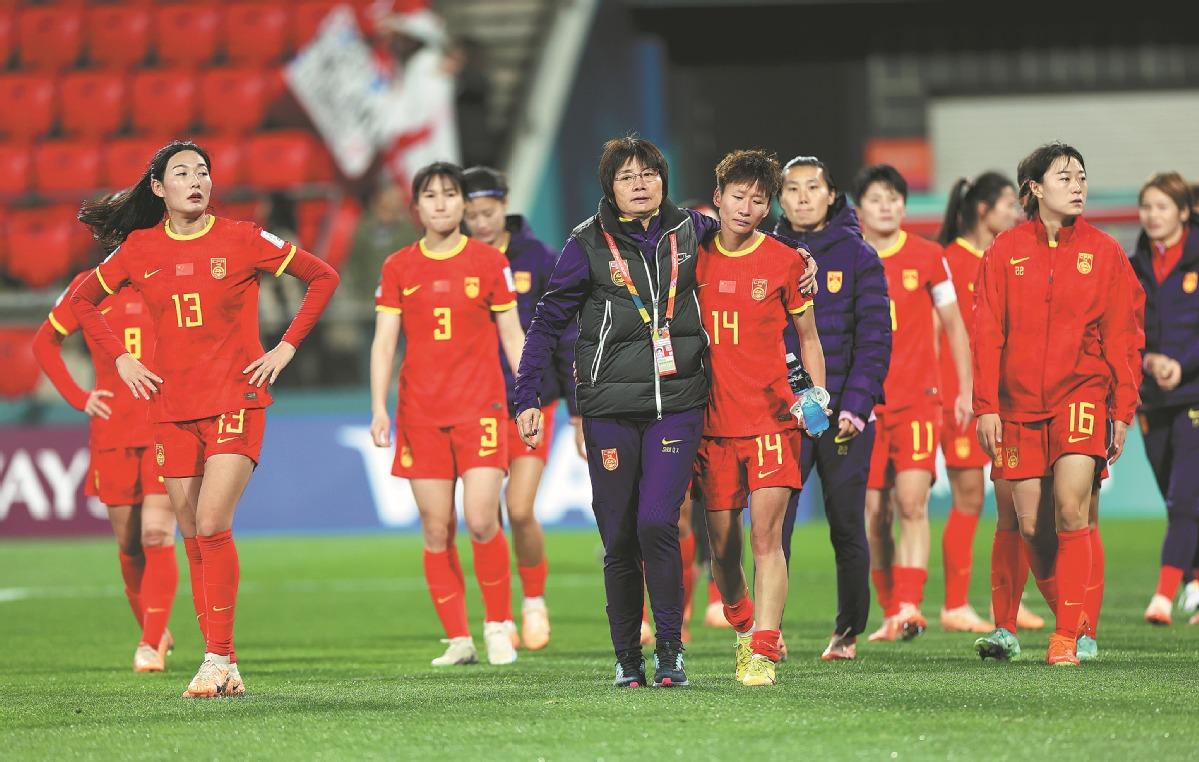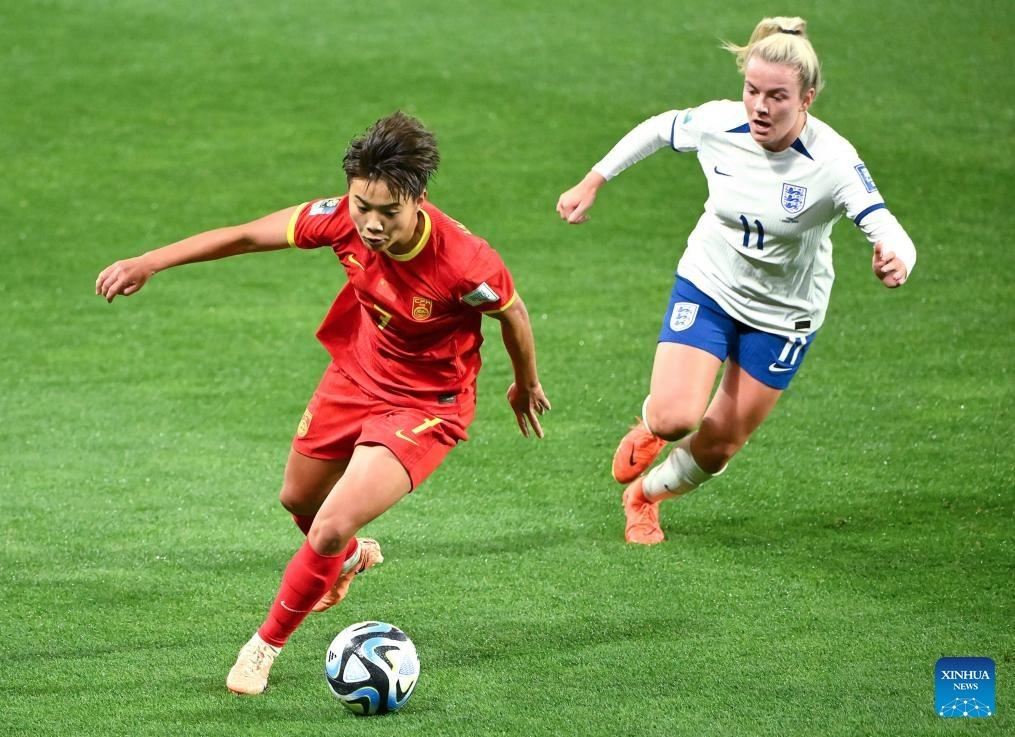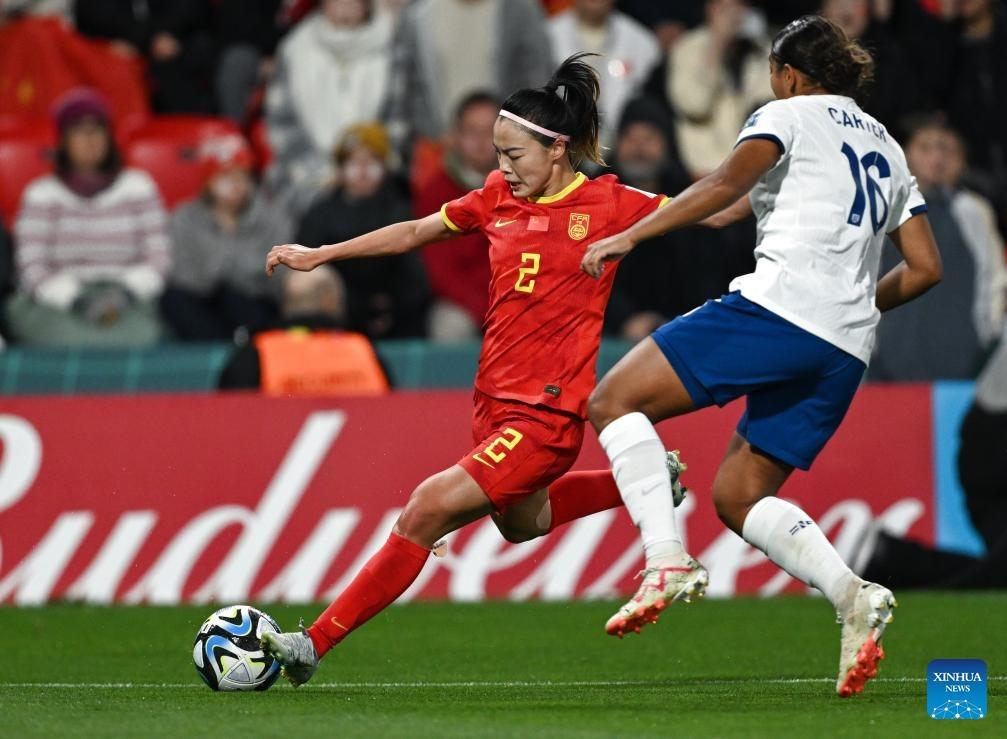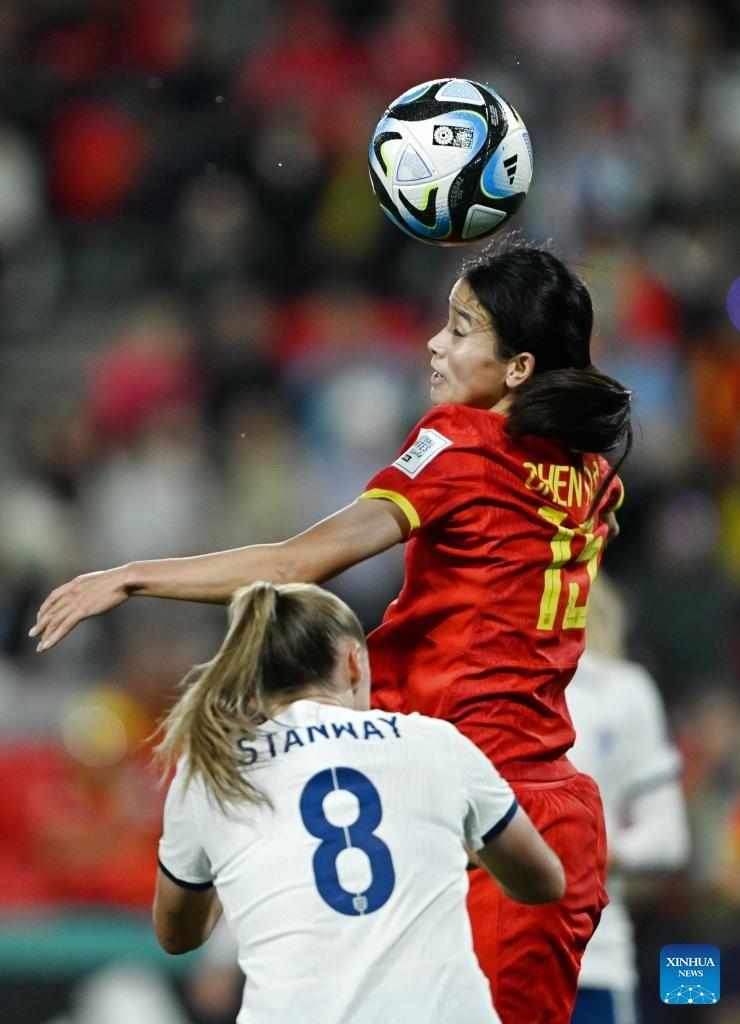 Team China head coach Shui Qingxia leads the players off the pitch after a 6-1 loss to England at the Women's World Cup in Adelaide, Australia, on Aug 1, 2023. (PHOTO / XINHUA)
Team China head coach Shui Qingxia leads the players off the pitch after a 6-1 loss to England at the Women's World Cup in Adelaide, Australia, on Aug 1, 2023. (PHOTO / XINHUA)
Now it seems the Steel Roses have lost the bragging rights over their underachieving men's counterparts.
A humiliating 6-1 rout by European champion England at the FIFA Women's World Cup exposed a brutal reality — that stagnant talent development and a poor-quality domestic league have left the Chinese women's game trailing far behind the rest of the world.
As the elated Lionesses celebrated qualifying for the knockout stage, Team China's players cut dejected, exhausted figures on the pitch as they struggled to come to terms with failing to emerge from the tournament's group stage for the first time.
Once a global powerhouse and a major success story among the country's "big-ball" teams, the Steel Roses have done their country proud through the decades — most notably with back-to-back runner-up finishes at the 1996 Olympics and 1999 World Cup, where their scintillating play and mental resilience earned them their famous nickname.
The good old days, however, have long gone with the future looking bleak as the gap between China and the world's best appears to grow bigger by the year.
 China's Wang Shuang (left) competes during the Group D match between China and England at the 2023 FIFA Women's World Cup in Adelaide, Australia, Aug 1, 2023. (PHOTO / XINHUA)
China's Wang Shuang (left) competes during the Group D match between China and England at the 2023 FIFA Women's World Cup in Adelaide, Australia, Aug 1, 2023. (PHOTO / XINHUA)
"Perhaps the biggest takeaway for us is that we have realized how far we've been left behind," head coach Shui Qingxia said after Team China's 6-1 loss to England in the final Group D game on Tuesday in Adelaide, Australia.
Once a global powerhouse and a major success story among the country's "big-ball" teams, the Steel Roses have done their country proud through the decades — most notably with back-to-back runner-up finishes at the 1996 Olympics and 1999 World Cup, where their scintillating play and mental resilience earned them their famous nickname
"We have a long way to get back and we have to figure out the right direction ... I still want to thank my players, though, for their fighting spirit. They gave all they have, but it's obviously far from enough.
"The gap between us and the top teams in Europe is getting bigger, technically and physically. We have a lot of work to do and it takes more than one generation's efforts to catch up again," said Shui, a formidable member of the silver-winning Olympic team at the 1996 Atlanta Games.
ALSO READ: Women's World Cup: England tops Group D, eliminates China
Funded and supported by the State-run sports system, the Chinese women's program flourished in the 1990s when the rest of the world hadn't invested seriously in the women's game.
The Steel Roses reached the knockout stage at the previous seven World Cups, however their decline was already in evidence two years ago at Tokyo 2020, where they conceded 17 goals in three matches to crash out with their worst-ever performance at the Olympics since the women's game's debut in 1996.
Ironically, England's current coach, Dutchwoman Sarina Wiegman, was also the mastermind behind the Netherlands' 8-2 rout of the Steel Roses at the Tokyo Games.
A surprising triumph at last year's Asian Cup, Team China's first international title since 2006, sparked hopes of a revival, but that triumph has proven to be a flash in the pan.
Team China secured just one win Down Under — a 1-0 win against Cup debutant Haiti, secured by star striker Wang Shuang's late penalty. In its other two group matches, China was second-best in all areas of the pitch, especially against England and to a lesser extent Denmark — both squads packed with players competing in the elite leagues of Europe and North America.
 China's Li Mengwen (left) breaks through during the Group D match between China and England at the 2023 FIFA Women's World Cup in Adelaide, Australia, Aug 1, 2023. (PHOTO / XINHUA)
China's Li Mengwen (left) breaks through during the Group D match between China and England at the 2023 FIFA Women's World Cup in Adelaide, Australia, Aug 1, 2023. (PHOTO / XINHUA)
As the only Chinese player, who's made a real impact overseas in recent years, former Paris Saint-Germain playmaker Wang attributes the slump to the domestic game's shrinking foundation.
The Steel Roses reached the knockout stage at the previous seven World Cups, however their decline was already in evidence two years ago at Tokyo 2020, where they conceded 17 goals in three matches to crash out with their worst-ever performance at the Olympics since the women's game's debut in 1996
"We didn't make good role models," Wang said as she fought back tears following the England loss.
"I hope we can get more children playing the game in the future. I also hope that more coaches can train more children to play the game better so that they will not be so embarrassed when they play for the national side in the future.
ALSO READ: Rebuilding Steel Roses planting seeds of hope
"England has developed its women's squad so quickly and so effectively, largely thanks to its strong league system, solid foundation and abundant resources. We simply have a lot of catching up to do," added Wang, who scored China's solitary goal, also a penalty, against England.
Except for Wang, who now plays for Racing Louisville in the US, Team China had only one other player on its World Cup roster to impress in Europe (midfielder Shen Mengyu with Scottish club Celtic), where the women's leagues are enjoying rapidly increasing TV ratings and attendances, and a steady influx of international stars.
China's 12-club domestic league, however, has been withering, due in part to the lack of investment and the effects of the pandemic over the past three years.
 China's Chen Qiaozhu (right) heads the ball during the Group D match between China and England at the 2023 FIFA Women's World Cup in Adelaide, Australia, Aug 1, 2023. (PHOTO / XINHUA)
China's Chen Qiaozhu (right) heads the ball during the Group D match between China and England at the 2023 FIFA Women's World Cup in Adelaide, Australia, Aug 1, 2023. (PHOTO / XINHUA)
Although the Chinese women outdo their male counterparts in terms of results, the Women's Super League is more akin to the men's third tier than the top-flight CSL in terms of attendances, salaries, sponsor interest and coverage.
England has developed its women's squad so quickly and so effectively, largely thanks to its strong league system, solid foundation and abundant resources. We simply have a lot of catching up to do.
Wang Shuang, Chinese professional footballer
Encouraging more players to challenge themselves in overseas leagues is a must, legendary goalkeeper Gao Hong reckoned.
"Our game in the past was nowhere near the pace, physicality and competitive level that you now see in the world's best leagues," said Gao, the starting goalkeeper on China's 1999 World Cup team.
"Our domestic league is lagging far behind the world so we need to send more players overseas to learn and improve."
READ MORE: China's captain expects to show their style in Women's World Cup
Despite the disheartening World Cup campaign, Team China has barely any time to feel sorry for itself, with the Hangzhou Asian Games taking place next month and the second-phase Asian qualifiers for the Paris Olympics kicking off in October.
"Emotionally, it's really hard to buck up at the moment. But we still have a job to do," said coach Shui.
"Hopefully, we can learn and grow from this experience, and pull ourselves together for the next challenge."


